What happens before, during, and after crying?
Touching movies, stressful events at home or work, and even good news like a wedding or a baby might bring on the waterworks. Sometimes, you just need to let the tears flow. But you might not know that crying can have a big effect on your body and mind—here’s how.
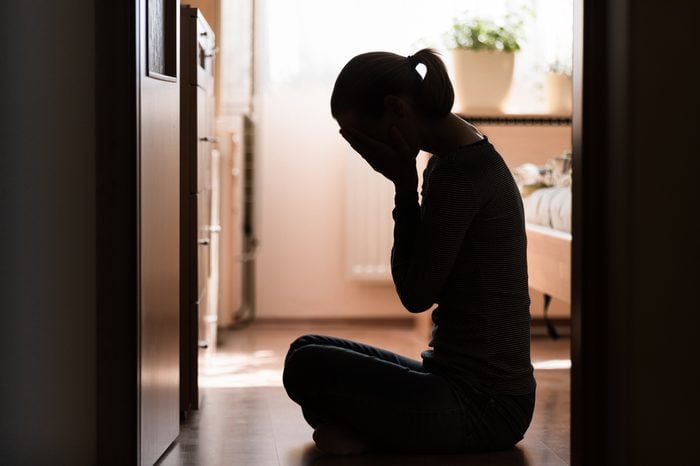
Crying relieves stress
Humans are the only species to weep from emotions, but scientists still don’t know exactly how the physical act of crying is connected to our feelings. Why do we cry when we’re sad (and sometimes happy)? One of the benefits of blubbering may be that it helps relieve the physical tension of feeling upset. “It seems that crying begins just after the peak of physiological arousal as sympathetic activity starts to decrease and parasympathetic activity increases, helping to bring the body back to homeostasis,” says Lauren Bylsma, PhD, an assistant professor of psychiatry at the University of Pittsburgh School of Medicine. In other words, crying occurs as our body returns from an aroused, “fight or flight” state to a calm, “rest and digest” state. (Check out these stress management tips from experts.)
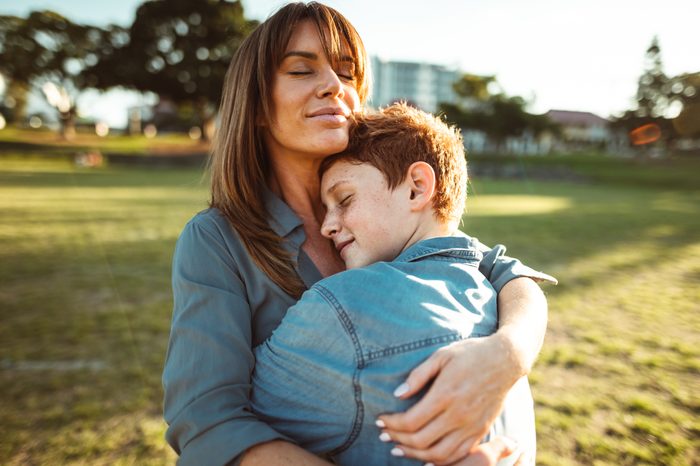
Crying boosts mood
While you might think that crying would make you feel better if it means your stress is relieved—and it does, sometimes. “In surveys about two-thirds of people generally report feeling better after crying,” says Jonathan Rottenberg, PhD, a psychology professor at the University of South Florida. “It’s likely that people are overreporting or misremembering these benefits of crying, however, because when we elicit crying in a controlled laboratory setting, it’s not as clear that crying makes people feel better. So yes, crying helps our mood—just less than we commonly believe.”
And how others react to our crying is one of the most important factors in determining how we feel afterward, according to world-renowned crying expert Ad Vingerhoets, PhD, author of Why Only Humans Weep and professor of social and behavioral sciences at Tilburg University in the Netherlands. “If they react with understanding and succor, it is much more likely that you’ll feel better than if they ridicule you and you feel embarrassment,” Dr. Vingerhoets says. “In many cases, the better mood after having cried is thus the consequence of receiving emotional support and comfort.”
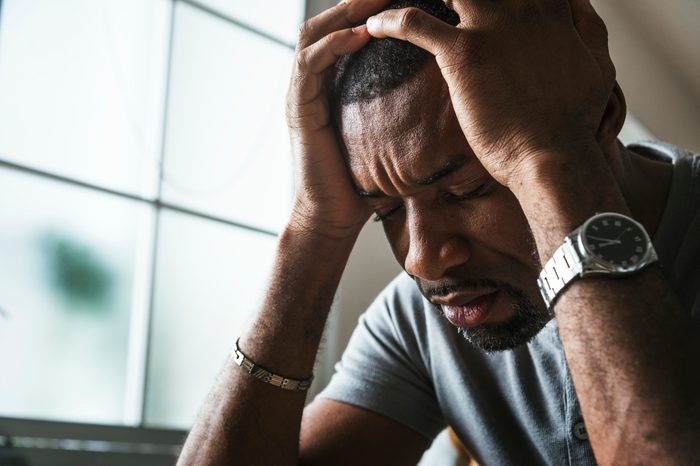
Crying sometimes makes you feel worse
Crying in the wrong place at the wrong time, or around people who react negatively to your crying can definitely make you feel worse. “Crying at home or with supportive friends is healthy, but crying at work might be seen as inappropriate,” says psychiatrist Judith Orloff, MD, author of The Empath’s Survival Guide: Life Strategies for Sensitive People. In addition, although crying may make us feel better in the long run, studies show that the immediate effects of crying may actually worsen our mood. “In a lab study with people watching a sad movie, it takes some time before people feel better after having cried,” Dr. Vingerhoets says. “Immediately after a sad film, the participants reported a worse mood, but 20 minutes and, in particular, 90 minutes later, they reported a better mood than before the movie.” So, it may take a bit of time for crying’s mood-boosting effects to kick in.
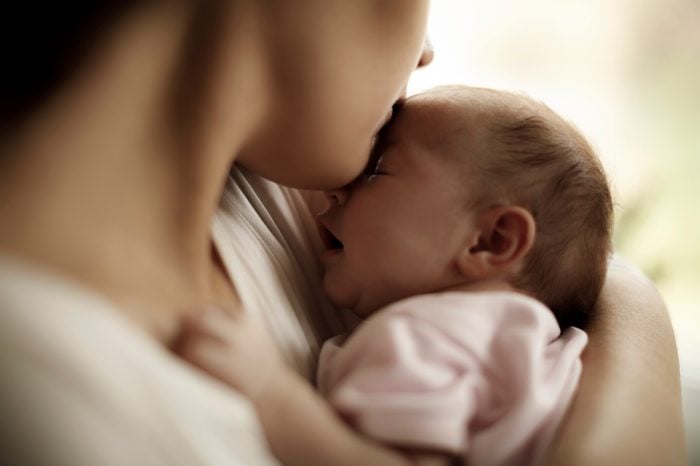
Crying improves communication
Not surprisingly, crying in humans first evolved as a way for an infant to get its mother’s attention. “Human infants are the most helpless creatures—they cannot cling to fur like other primates, or follow their mother like ducks,” says Dr. Vingerhoets. Tears of babies and children add a visual component to this cry for help and target a specific caregiver who can see them. As grownups, people have adapted this biological function to an emotional one. “Adult tears, like vocal crying, mainly convey the message, ‘I need you, help me!'” Dr. Vingerhoets says. “It is, in particular, a reaction to a state of helplessness, which is the opposite of fight-or-flight.”
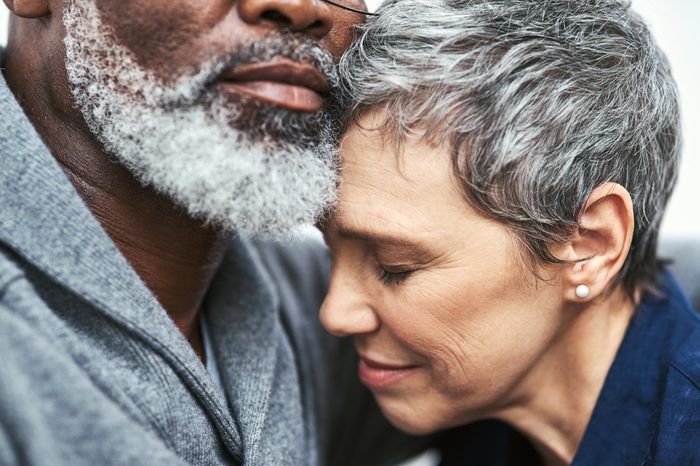
Crying forges bonds
When we communicate with others through tears, we are revealing our own vulnerability. “With supportive people, it can create an increased feeling of bonding and connection,” Dr. Orloff says. “You trust the person enough to cry around them.” Crying is, therefore, a signal that we feel close to someone, and this can promote an empathetic response and an emotional connection. Dr. Vingerhoets says that because we don’t like to show our weakness to strangers, we try not to cry in front of them, and instead save our tears for those we’re closest to. Here are telltale signs you might be an empath.

Crying helps us get what we want
Anyone who’s ever cried after getting pulled over for speeding knows that tears can be a way to provoke a specific reaction that works in our favor. Even if we don’t consciously mean to manipulate, our crying may have the result of neutralizing anger and making others feel guilty or more inclined to bend to our will. “Crying may help elicit social benefits,” Dr. Bylsma says. “It seems to have an important social function to reduce aggression from others in conflict situations.”
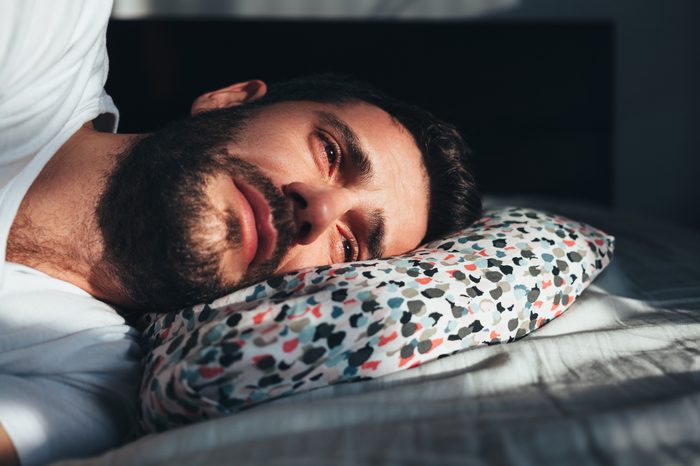
Crying is a private release
If crying is such an important communication tool, why do we cry when we’re alone? A poll by the airline Virgin Atlantic, which now gives “emotional health warnings” before sad movies, showed that 41 percent of men hid tears in their blankets while on flights (women were more likely to pretend they had something in their eye). This may go back to the idea of the body returning to a state of rest through crying—after a busy or stressful day, you’re finally alone with your thoughts. Dr. Rottenberg also says that crying while alone may still be a way to reach out to the universe. “Often when people cry in private they are actually still appealing for help, such as asking God for help,” he says.
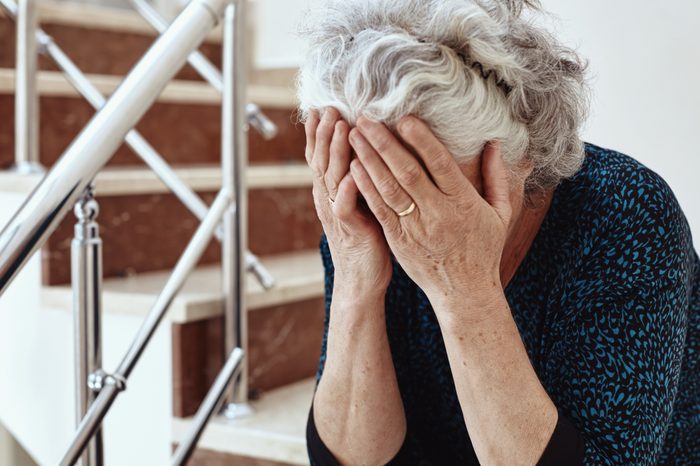
Crying may get rid of toxins
The biochemist William Frey performed some groundbreaking crying research in the late 1970s and early 1980s that suggests that tears help rid the body of unwanted toxins. “He compared irritant tears [such as from chopping onions] to emotional tears and found some chemical differences, like a higher content of some proteins in emotional tears, that may be due to the release of stress by-products,” Dr. Bylsma explains. But, she says, these results haven’t been replicated recently, in part because it’s really hard to study this in a lab. “It’s very challenging to have individuals cry to emotional stimuli naturally while having their tears collected, and most of the tears are actually absorbed in the nasal passages and cannot be collected,” she says.
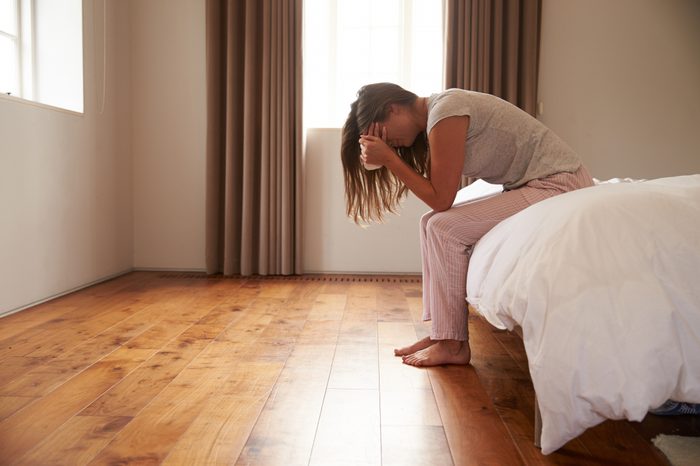
Crying may be a natural sanitizer
Another one of the purported benefits of crying is that it helps kill bacteria. It is true that tears contain lysozyme, a protein that can destroy harmful molecules. But before you go thinking that your tears have healing powers like the phoenix in Harry Potter, remember that scientists have yet to prove this definitively. “There is really no good evidence showing the health benefits of crying,” Dr. Rottenberg says. “These ideas persist because there is almost no science on the physiology of crying, and our folk beliefs, which teach that it is good for health to cry, fill this void.”
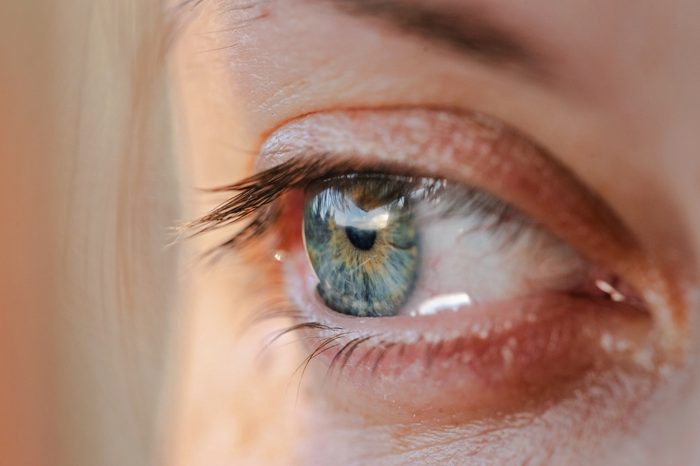
Tears help your eyes
Tears moisten the eyes and keep them healthy. “The biological function of tears is to keep the eye moist or protect it from fumes or debris that get into the eye,” says Dr. Bylsma. “Emotional tears seemed to have evolved from this basic biological process into something more complex in humans that can occur for purely emotional rather than physical reasons.” Nevertheless, peepers that aren’t moisturized by tears can develop “dry eye,” which can cause pain and even lead to vision loss. (Check the signs you could have dry eye syndrome.) But too much crying can actually irritate the eyes, which is why they get red and puffy after a major weeping session. How does this connect to emotional crying? It’s not clear, but a study of patients with the dry eye condition Sjogren’s syndrome found that they had a decreased ability to identify their emotions.
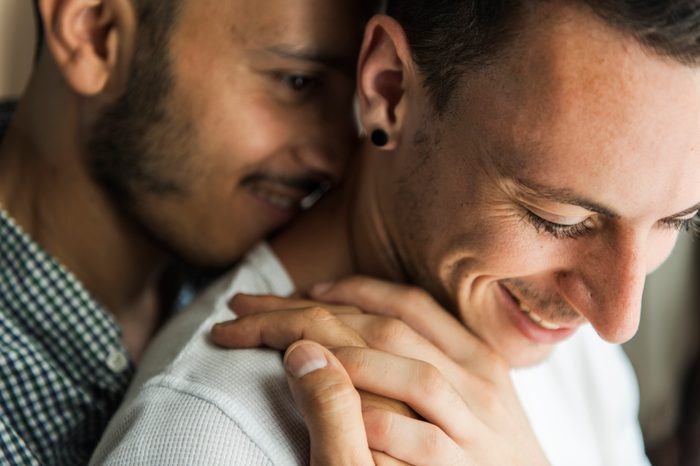
Crying has a connection to sex hormones
Higher testosterone levels may mean men are less likely to cry. “There is mainly anecdotal evidence—in transgendered [people] and men with prostate cancer receiving anti-hormones, but also some animal studies—that testosterone has an inhibitory effect on crying,” Dr. Vingerhoets says. For women, a change in the level of estrogen can increase crying during PMS and postpartum. But, how often men and women cry also has a cultural component. “The crying process is physically the same as far as we have measured, but women do cry much more frequently than men,” Dr. Bylsma says. “Men often hold back tears for fear that society won’t seem them as strong or powerful—they are conditioned to feel shame with tears,” says Dr. Orloff. “In our culture women have more permission to cry than men, so we are freer with it.”
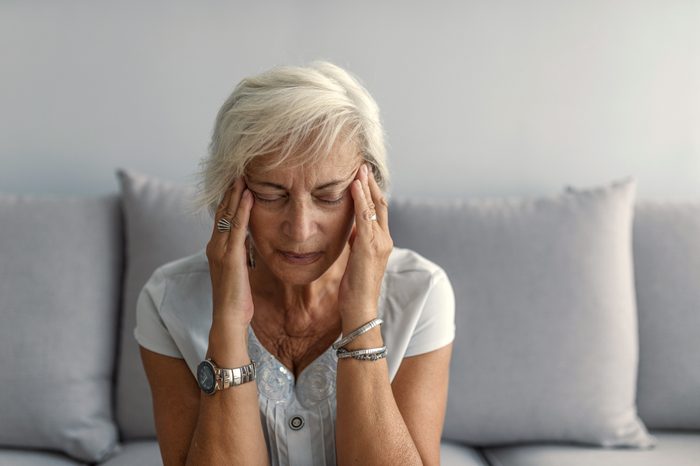
Crying has major physical effects
Crying isn’t just an emotional act—it’s a physical one. Wracking sobs, headaches, blotchy skin, a runny nose, and full-body shakes are just a few of the effects crying can have on your body. Why does this happen? According to Dr. Rottenberg, it has to do with the high arousal state of the flight-or-flight response. Although crying can be the bridge that leads to a more restful state, “in the short term of minutes, there is clear evidence that the act of crying is highly arousing,” he says. “People who cry exhibit elevated heart rates and increased sweating. In this sense, crying is a ‘workout’ for the body. However, the door is still open on the hypothesis that crying calms the body over the longer term—we just need more studies that examine the short- and longer-term effects.”
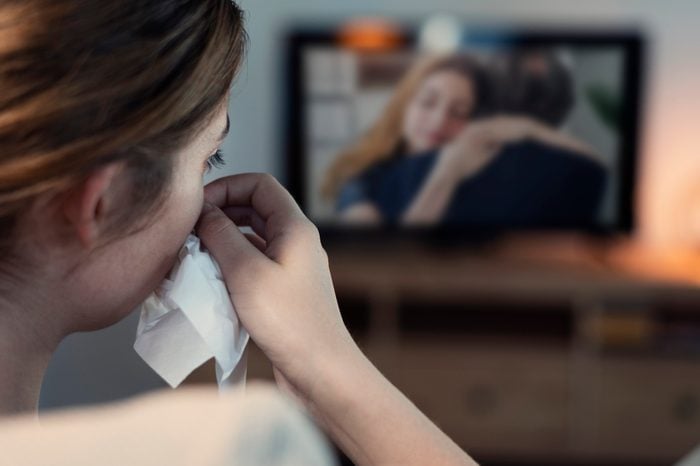
Crying affects other hormones as well
In both men and women, other hormones may be affected by crying. “Though the little available evidence is not really strong, it’s been suggested that prolactin may facilitate crying,” Dr. Vingerhoets says. “It maybe can explain the maternity blues, the effects of alcohol on our crying threshold, and the occasional tears during orgasm.” We do know that crying increases endorphins, the body’s natural feel-good hormones, Dr. Orloff adds, “so crying is clearly releasing tension and, as a result, you feel better.” This could be why we sometimes seek out crying by watching a sad movie.

Happy crying also helps relax the body
Just as with negative emotions, a level of heightened arousal due to positive feelings can lead to crying. “Crying from negative emotions like sadness, frustration, and anger is more common but crying does occur during extreme positive emotions too, like happiness, wonder, and awe,” says Dr. Bylsma. “It seems that crying is associated with intense physiological arousal that can be connected to both positive and negative emotions, and occurs just after the peak of the emotional experience as the individual is beginning to experience the release of that emotion.” This is why we might cry at weddings, when we see a newborn baby, or even at a magnificent sunset. (This is why you might get a lump in your throat when you cry.)

